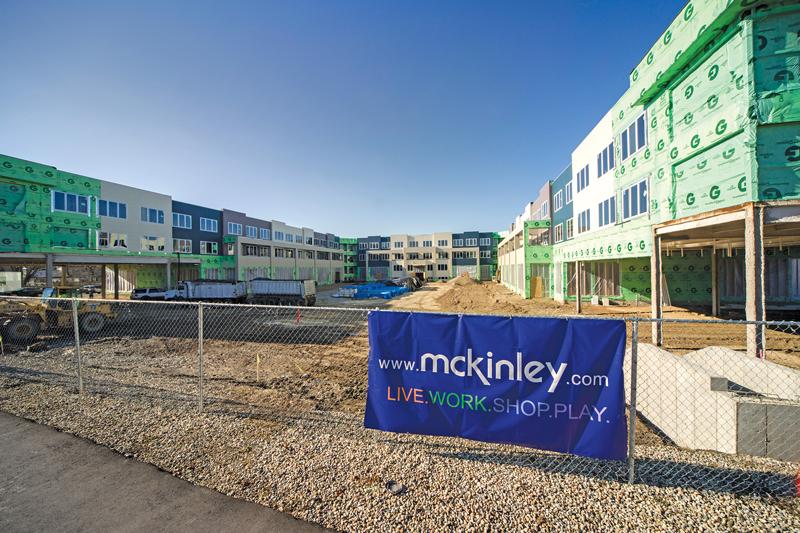A flurry of email messages crossed Jennifer Nguyen’s mailbox after signs from McKinley were removed from her neighborhood’s Packard Square development. Nguyen runs the Georgetown neighborhood email list, and people wanted to know if the disappearance meant that the real estate company was no longer acting as receiver for the project, currently stalled for what seems like the umpteenth time.
Suburban Detroit developer Craig Schubiner bought the old Geogetown Mall in 2001. In 2007, he got city approval to replace it with a new center anchored, like the original, by a Kroger supermarket. But Kroger never signed on, the other retail tenants closed or moved, and by 2009 the center was sitting vacant.
It was already growing derelict when Schubiner came back with a new plan in 2011 to shrink the retail space and add more than 200 apartments. Schubiner told planning commissioners that he hoped to complete the project by 2013.
But all that happened in 2013 was the demolition of the old center. A sign on the construction fence promised occupancy in spring 2015, but work started in earnest only at the end of 2014, after Schubiner lined up a $53 million construction loan.
From that point on things moved quickly. By last spring the building was framed in and largely enclosed, and online listings advertised 249 apartments for August occupancy. But then all work ceased.
Exactly why is buried in a 6,500-page court file–which, when an Observer writer inquired about it recently, was off being reviewed by an appellate court in Grand Rapids. But in November, judge Archie Brown forced the troubled project into receivership. McKinley was hired to protect the lender’s interest in the property and worked quickly to winterize the buildings and protect them from further damage.
McKinley is still on the project. The banners on the windswept fence were acting “like a sail,” explains Ward Four councilmember Jack Eaton, who has been at the forefront of elected officials’ response to the increasingly difficult and strained relationship between Schubiner and the neighbors. The signs were removed lest they fly away, possibly taking the fence with them. More substantial work on the site is awaiting the spring construction season and a final report of a forensic audit spelling out the repair work necessary before finish construction can start.
In February, as an Observer writer inquired about the project at the assessor’s office on the fifth floor of City Hall, a man came over and introduced himself as Craig Schubiner. When the writer identified himself and pulled out a notebook, Schubiner said he’d taken him for a “tax consultant” and stepped away–but could be heard telling assessor Dave Petrak that he hoped to refinance the property.
Eaton had already voiced skepticism about that, saying “I can’t imagine anyone loaning him money.” Indeed, Packard Square is just a blip next to the epic financial failure of Schubiner’s Bloomfield Park, a $350 million megaproject that has stood half-finished on Telegraph Rd. in Oakland County since 2008.
Whether Schubiner or another owner brings Packard Square to completion remains to be decided. Though the property is in receivership, it has not yet been foreclosed. If and when it is, Schubiner will have 180 days to raise funds to redeem it.
The wayward McKinley banners have since been replaced by smaller signs that can flap freely. So when might Packard Square finally open? At a December meeting at Cobblestone Farm, McKinley CEO Albert Berriz predicted that it would sometime in 2017. He promises an update at a March meeting at Cobblestone Farm. For more information, email jengrffth@yahoo.com.
—
This article has been edited since it was published in the March 2017 Ann Arbor Observer. Jennifer Nguyen’s email address has been corrected.




The next meeting on the Packard Square project will be 6 p.m. on Wednesday, March 22, at Cobblestone Farm.